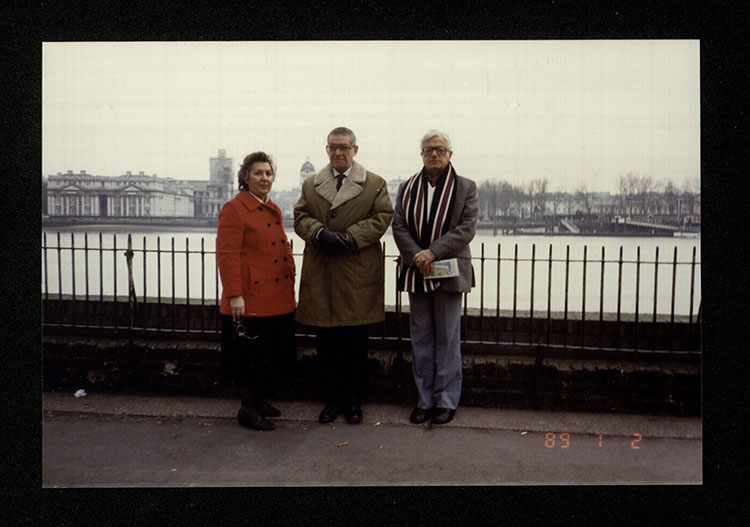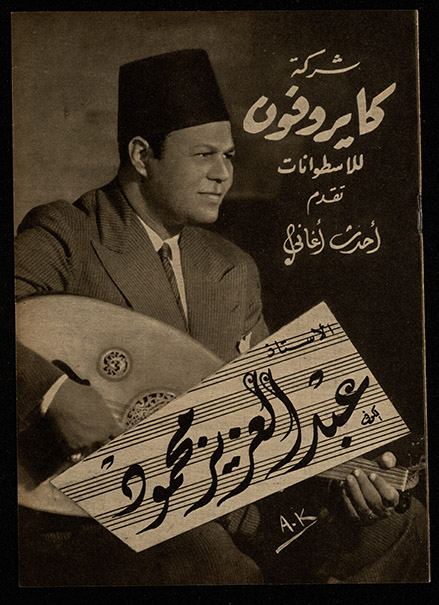The Kedourie Papers: the world and work Sylvia G. Haim
In the next part of the series of blog posts about the Archive of European Intellectual Life, project archivist Miriam Buncombe, focuses on the work of Sylvia Kedourie.

Having married Elie Kedourie in 1950, Sylvia, who continued to publish under the name Sylvia G. Haim, received her doctorate from the University of Edinburgh in 1953, writing on ‘The Idea of a Precursor, ‘Abd al-Rahman al-Kawakibi (1849 – 1902) in Relation to the Trend of Muslim-Arab Political Thought.’ This sets the tone of the relationship of this scholarly couple, who, in a remarkably modern turn for the 1950s, both continued in academic research throughout their lives. Sylvia, like Elie, was strongly influenced by her personal experience of the destruction of the Iraqi Jewish community, to which her family had belonged for generations, and the changes to the city of Baghdad where her father and grandfather’s names were listed among the subscribers to the Jewish schools she had attended as a girl. Her papers include a brief, frustratingly incomplete, account of a Baghdad Childhood, describing the rhythms of family life in her early home. Her experiences of the dramatic and lasting influence of sweeping political change on this community and the difficulties of the Jewish minority in Iraq led her not to reject Arab culture, but rather to seek a better understanding this world and to share her insight with others through hospitality and scholarship. Taking an aspect of her Baghdadi home with her to London, Sylvia’s dinners were well-known.
Following her doctoral work, Sylvia conducted research on the socio-cultural context of contemporary Egypt, first through her detailed study on ‘State and University in Egypt’ examining the relationship between politics and education. This includes annexes with data on the costs of university education in Egypt, compiled in 1956, and her handwritten table of annual accounts of Egyptian Universities. Such research was complemented by her interest in the development of nationalism and Islamic ideologies in Egypt, and in 1958 she completed a translation of ‘The Principles of Islamic Government’ by Muhammad ‘Abdullah As-Samman, a member of the Muslim Brotherhood, which had been published in Cairo in 1953. In a brief introductory essay, Sylvia examines As-Samman’s assessment of Arab-Muslim and Western political regimes, and the ways in which his arguments represented the urban Muslim community of Egypt in the 1950s. Her continuing interest in the broader cultural development of Egyptian society is captured in a series of Arabic-language pamphlets from the early 1950s containing popular song lyrics.

While the theme of Arab nationalism continues throughout her work, in her later research Sylvia takes an interest in the position of women in the Arab culture and their representation in the literary traditions of the Middle East. Her notes include work on the emancipation of women in Iraq, newspaper clippings relating to cases of the impact of Islamic law on women and Sylvia’s discussion of women in contemporary literature, such as in a novel by Colette Suhail (Beirut, 1961). There are a series of draft papers around this subject, including for a talk on ‘Arab Woman and Her World’, given by Sylvia at the Netherlands Institute for Advanced Study, Amsterdam, in 1981, as well as her correspondence relating to difficulties in finding a publisher for her subsequent article, ‘The Situation of the Arab Woman in the Mirror of Literature’. A further area of focus is the modern history of Iraq. Here, Sylvia writes on the development of the Ba’ath party and Ba’athist doctrines, as well as the history of the Jewish community in Iraq. This knowledge of contemporary politics was put to good use in her work for the Institute for Jewish Affairs between 1974 and 1975, for which Sylvia prepared a series of articles on ‘Arab News and Views’ with topics including the assassination of King Faisal of Saudi Arabia in 1975 and on press freedom in Egypt.
While Sylvia had worked informally as editor for Middle Eastern Studies since its inception, she became Editor in Chief following the sudden death of Elie in 1992. In a series of elucidating talks, which appear to have been given shortly following his death, Sylvia outlines the early development of the journal, its aims, and her ongoing difficulties with finding good reviewers. Sylvia further edited several volumes of her late husband’s works for posthumous publication, including a memorial volume of Middle Eastern Studies for Elie. Her extensive annotated bibliography of Elie’s works prepared for that volume can be found in this collection, as can her meticulously indexed files of Elie’s published works and published works referencing him.
With academic and personal acquaintances across the Middle East, the expansive series of correspondence files within the Kedourie papers provide chronological snapshots of the fast-moving political changes in the region between the 1950s – 1990s. In two much-battered letters dating to 1950, Yohanan Ramati, at the time working with the Jewish Appeal in Jerusalem, writes to Elie providing his eye-witness impressions as immigrants from Jewish communities from around the world begin to come to Israel, with the economic and cultural impacts of this influx. Later, a cluster of correspondence centres around the Arab-Israeli conflict, Yousef Elkabir sending to Sylvia his report to the Israeli government regarding the implications of the conflict and the relationship with Palestine. More generally, letters commenting on Israeli politics, academia and world perceptions of the Middle East, allow the reader an insight into the everyday perceptions and impacts of the ideological questions of nationalism, identity and community explored in the research of Elie and Sylvia Kedourie.
Miriam Buncombe
Project Archivist